It was a day of incredible drama throughout Ukraine. After a week of bloody protests the president finally fled, the police melted away and the opposition seized control. Ex-prime minister Yulia Tymoshenko was released and addressed huge crowds in Kiev. Shaun Walker and Harriet Salem report
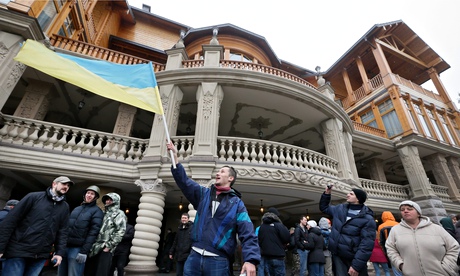
Protesters wave the Ukrainian flag in front of the residence of president Viktor Yanukovych. Photograph: Sergey Dolzhenko/EPA
As one disgraced president fled Kiev in the early hours of Saturday morning, so another aspiring one had landed in the city by evening. Within a few hours of being released from her prison hospital in the eastern city of Kharkiv, Yulia Tymoshenko had flown to Kiev and was being wheeled into Independence Square to address the crowds.
Hunched in a wheelchair, needed because of back problems, but with a resolute expression and her hair pulled into her trademark plait, she yelled rousing words from the stage to the crowd, telling them they must stay in central Kiev until their work was over, and those responsible for the violence are punished.
"If we let those who shot bullets into the hearts of our heroes escape responsibility, if we forgive them, it will be our shame for ever," she said, in a voice cracked with emotion. She had earlier said she plans to run for president, in elections that could now come as early as May. "Our homeland will from today on be able to see the sun and sky as a dictatorship has fallen," she added.
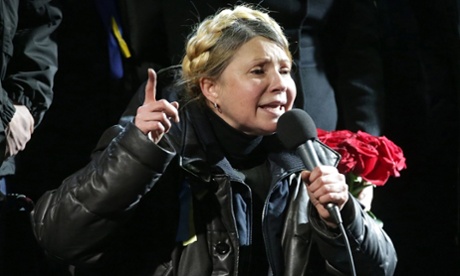 Former Ukrainian prime minister Yulia Tymoshenko speaks during a rally in Kiev after her release from prison. Photograph: Maxim ShipenkovEPA
Former Ukrainian prime minister Yulia Tymoshenko speaks during a rally in Kiev after her release from prison. Photograph: Maxim ShipenkovEPA
Not everyone in Ukraine likes Tymoshenko; indeed, far from everyone on Independence Square likes her, as could be divined from the lukewarm reaction she was given. Her words of support for the protest and of grief for the dead were well received, but only a minority joined in the chanting of her name.
Nonetheless, few would dispute her extraordinary political acumen, something that has been acutely missing from the opposition leaders since protests broke out in Ukraine, as they have uneasily surfed the waves of discontent rather than directed events. Although she appears far more frail, aged and incapacitated than she did when she was last in the public eye, she clearly still retains her fiery political ambition.
"I am returning to work, she said. "I will not miss a minute, in order to help you again feel happy in your own land."
In an extraordinary symmetry, as Tymoshenko's plane was landing in Kiev, there were rumours that ousted leader Viktor Yanukovych's jet was being denied permission to leave the country. In a stilted television address earlier in the evening, he announced he was still the president, but few others seemed to believe him. His exact location was unclear throughout the day, but it could be said with certainly that he was not at home, and half of Kiev turned up to his residence to see for themselves. With its pine pavilions, covered tennis courts, bubbling fountains and palatial residences, the Mezhyhirya compound provided Ukrainians with a striking picture of the bloated corruption of Yanukovych and his clan.
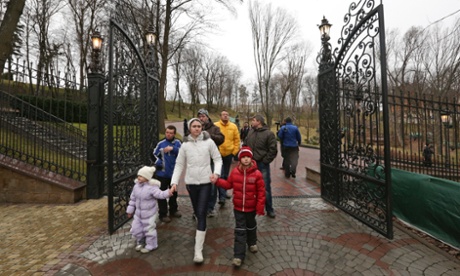 People walk on the grounds of the Mezhyhirya residence of Ukraine's president Viktor Yanukovich outside Kiev. Photograph: Konstantin Chernichkin/Reuters
People walk on the grounds of the Mezhyhirya residence of Ukraine's president Viktor Yanukovich outside Kiev. Photograph: Konstantin Chernichkin/Reuters
Few had any doubts as to the level of wealth he had amassed for himself, and the compound itself has been the subject of swirling rumours for some time. But seeing the wealth of riches with their own eyes still took their breath away.
Thousands streamed to his residence, a 40-minute drive from central Kiev, to see the epicentre of the regime they have been protesting against for three months. Yanukovych has only rarely appeared in public since the crisis began in early December. He was presumably pacing the miles of paved walkways amid the lakes, fountains and exotic pet collection, trying to weigh up the pressure from Russia to crack down against the pressure from the west to make concessions.
And then, suddenly, he was gone. His residence was unguarded, the control booths dotted along the high, forest-green security perimeter empty, and the police barracks at the back deserted. People streamed past the x-ray machine at the entrance to the compound, making mockery of a large sign warning that only those with official permission were allowed to pass this point.
"Walking around here, I get the impression that Ukraine should be a very rich country," said 22-year-old Anton, who was not part of the protest movement but lives in a village near the compound and arrived after reading online that it was possible to get in. "All of this, all of it, is paid for with our money, with the people's taxes."
It was not only the president who had disappeared. Along with him went the cordons of riot police in the centre of the capital, and indeed all signs of central authority, as Kiev appeared fully under the control of the protest movement. A few days ago the massed lines of police guarding government buildings and the presidential residence appeared impenetrable. They evaporated without a trace overnight.
On Saturday morning the parliament and the presidential administration compound in central Kiev were guarded by the protesters. They had also set up checkpoints at a number of key points on roads entering the city.
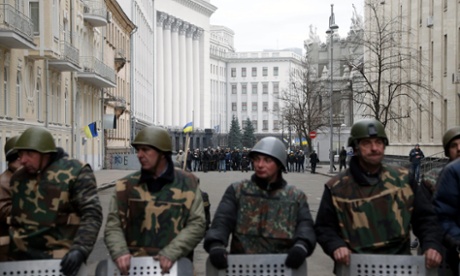 People guard the the Ukrainian parliament building in Kiev. Photograph: Maxim Shipenkov/EPA
People guard the the Ukrainian parliament building in Kiev. Photograph: Maxim Shipenkov/EPA
The only visible presence of authority was a quartet of traffic police, trying in vain to direct the huge flow of cars heading for the presidential residence. "We are just here to try to avoid traffic jams – we are working as usual," said one. Asked where the regular police were, he merely shrugged.
Late in the evening, a few police were visible outside the SBU security services building, with Ukrainian armbands tied to their arms to denote loyalty to the protest. They said they were from a division that guards foreign embassies, and were working in collaboration with the protesters. Inside the SBU building, there was a meeting between protest leaders and intelligence officials, in yet another sign that Yanukovych's grip on the capital is well beyond salvation.
Throughout the day, funeral services were held on Independence Square for the victims of last week, and in front of the main stage, coffins were still laid out in the rain. In the Obolon district, people paid their final respects to Sergey Shapoval. The 44-year-old, who was shot twice in the chest by snipers, was just one of 77 people to die in the capital during the bloodiest week in Ukraine's post-independence history. He was returned to his family home in an open casket. Pink, red and yellow carnations, brought by the mourners, covered his body.
A bearded Orthodox priest dressed in black robes performed an open-air farewell ceremony to an audience of around 70 family members and friends, who clutched at candles and crossed themselves. "It is the highest quality of person who gives his life for his friends," he intoned, splashing holy water across the body and performing religious rituals with perfumed incense smoke. "God show mercy to his soul."
His elderly mother, Katerina, stooped over the coffin, caressed her son's grey face and hair and wailed in grief. "Why did you leave me? See how many people have come here to see you pass. There is no life left in you. May the bastards that did this to you feel this on their own children."
Shapoval's neighbours and friends described him as a kind, generous and softly spoken man who had no radical views but felt it was his duty to stand with the protest movement, even when things got violent. His girlfriend, Olga Streltsova, is a volunteer medic helping with the protest movement, and said she last saw him a few hours before he died. "I was worried about him so I tried to get in contact, but he didn't answer his phone any more, he was dead," she said, tears streaming down her face. "He loved his country, he wanted the best for it. He died for this country – he gave everything to it."
Back at Yanukovych's compound, the mood was one of joy mixed with disbelief. A man wearing combat fatigues stood on top of a car and took to a loudspeaker to announce: "This is the day we were waiting for – today that day has come."
An advance group of protesters had entered the complex early in the morning, finding it deserted, and kept everyone else out for several hours, claiming they were checking the territory for mines.
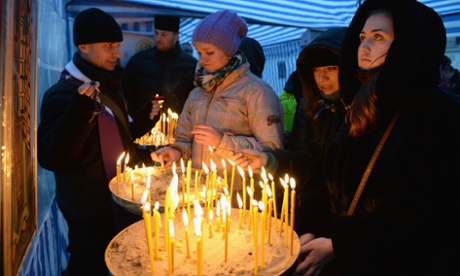 People light candles in Independence square after parliament voted to oust Viktor Yanukovych. Photograph: Jeff J Mitchell/Getty Images
People light candles in Independence square after parliament voted to oust Viktor Yanukovych. Photograph: Jeff J Mitchell/Getty Images
Once the gates were opened, there were entreaties that nothing should be looted or vandalised, which were met with enthusiastic applause, and, at least in the first hours, nobody attempted to break into any of the buildings. Instead they made do with peeks through the windows into marbled reception rooms lined with malachite vases and chandeliers. The main residence was a huge, five-storey wooden mansion, with twin balconies overlooking the vast expanse of the Dnieper river and adorned with faux-classical columns.
An MP from the nationalist Svoboda party, Eduard Leonov, said that in future the complex should become a sanatorium for disabled children and orphans. Astounded visitors gawped at riches on display as if they were visitors on a tour of a historical site. They took selfies by the sauna complex, the vintage car collection and the fountains.
The complex is so large that it took hours to walk around, and new discoveries were made all the time. By the river was a dock, a wooden boat decked out as a restaurant, an aviary filled with exotic birds and a petting zoo complete with antelope and pigs. A golf course stretched as far as the eye could see, and a smooth asphalted road led to a helipad.
A mirrored dome emerging from the ground turned out to be the roof of an underground boxing ring, while a pagoda housed a giant barbecue, complete with a grilling tray, skewers and stacks of firewood to create the perfect presidential kebab.
The situation in Kiev remains as unpredictable as it has been for most of the past three months, but one thing seems clear – Yanukovych is unlikely ever to live in this vast compound again. Although on Saturday evening he was still claiming to rule Ukraine, those touring the grounds said it was impossible.
"I work in construction, I know how much it must have cost to build something like this," said 41-year-old Alexander Mironyuk, shaking his head as he recorded a video of the grounds on his mobile phone. "Once everyone sees how he lived, there will be no way back for him. This is just disgusting."
It seemed like a good idea at the time. Photo by -/AFP/GettyImages
 Pro-Ukrainian activists rally in front of the Crimean parliament in Semfiropol on Feb. 26, 2014. Photo by Vasily Batanov/AFP/Getty Images
Pro-Ukrainian activists rally in front of the Crimean parliament in Semfiropol on Feb. 26, 2014. Photo by Vasily Batanov/AFP/Getty Images
 President Obama needs to play the game, or he risks being played by Vladimir Putin.
President Obama needs to play the game, or he risks being played by Vladimir Putin.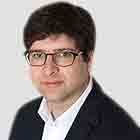

 Former Ukrainian prime minister Yulia Tymoshenko speaks during a rally in Kiev after her release from prison. Photograph: Maxim ShipenkovEPA
Former Ukrainian prime minister Yulia Tymoshenko speaks during a rally in Kiev after her release from prison. Photograph: Maxim ShipenkovEPA  People walk on the grounds of the Mezhyhirya residence of Ukraine's president Viktor Yanukovich outside Kiev. Photograph: Konstantin Chernichkin/Reuters
People walk on the grounds of the Mezhyhirya residence of Ukraine's president Viktor Yanukovich outside Kiev. Photograph: Konstantin Chernichkin/Reuters  People guard the the Ukrainian parliament building in Kiev. Photograph: Maxim Shipenkov/EPA
People guard the the Ukrainian parliament building in Kiev. Photograph: Maxim Shipenkov/EPA  People light candles in Independence square after parliament voted to oust Viktor Yanukovych. Photograph: Jeff J Mitchell/Getty Images
People light candles in Independence square after parliament voted to oust Viktor Yanukovych. Photograph: Jeff J Mitchell/Getty Images 
